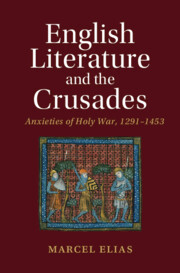Book contents
- English Literature and the Crusades
- Cambridge Studies in Medieval Literature
- English Literature and the Crusades
- Copyright page
- Dedication
- Contents
- Acknowledgments
- Introduction
- Chapter 1 Royal Emotions, Blasphemy, and (Dis)unity in The Siege of Milan and The Sultan of Babylon
- Chapter 2 Hopes and Anxieties of Conversion in the Otuel Romances
- Chapter 3 Women, God, and Other Crusading Motives in Guy of Warwick
- Chapter 4 Therapeutic Crusading and Excessive Violence in The Siege of Jerusalem and Richard Coeur de Lion
- Conclusion
- Notes
- Bibliography
- Index
- Cambridge Studies in Medieval Literature
Introduction
Published online by Cambridge University Press: 17 October 2024
- English Literature and the Crusades
- Cambridge Studies in Medieval Literature
- English Literature and the Crusades
- Copyright page
- Dedication
- Contents
- Acknowledgments
- Introduction
- Chapter 1 Royal Emotions, Blasphemy, and (Dis)unity in The Siege of Milan and The Sultan of Babylon
- Chapter 2 Hopes and Anxieties of Conversion in the Otuel Romances
- Chapter 3 Women, God, and Other Crusading Motives in Guy of Warwick
- Chapter 4 Therapeutic Crusading and Excessive Violence in The Siege of Jerusalem and Richard Coeur de Lion
- Conclusion
- Notes
- Bibliography
- Index
- Cambridge Studies in Medieval Literature
Summary
The introduction sets the book’s agenda: to offer a novel account of crusade culture from the Mamlūk reconquest of Acre (1291) to the Ottoman siege of Constantinople (1453) drawing on Middle English romances and their contexts in various literary, historical, and legal documents (in English, French, Occitan, German, and Latin). The political culture to which post-1291 crusade romances belonged, I argue, was ambivalent, self-critical, and riddled with anxieties. These anxieties were about issues as fundamental and diverse as God’s endorsement of the crusading enterprise, the conversion of crusaders to Islam, sinfulness and divisions within the Christian community, and the morality of violence. After situating the book’s key claims within debates on Edward Said’s Orientalism and crusade literature, I present its methodology: engaged historicism, attention to how romance writers adapted their sources, and analysis of emotional rhetoric. The book’s contributions to the history of emotions and Middle English studies are discussed, as are the new insights it provides into the historical dimensions of the genre of romance.
Keywords
- Type
- Chapter
- Information
- English Literature and the CrusadesAnxieties of Holy War, 1291–1453, pp. 1 - 17Publisher: Cambridge University PressPrint publication year: 2024

